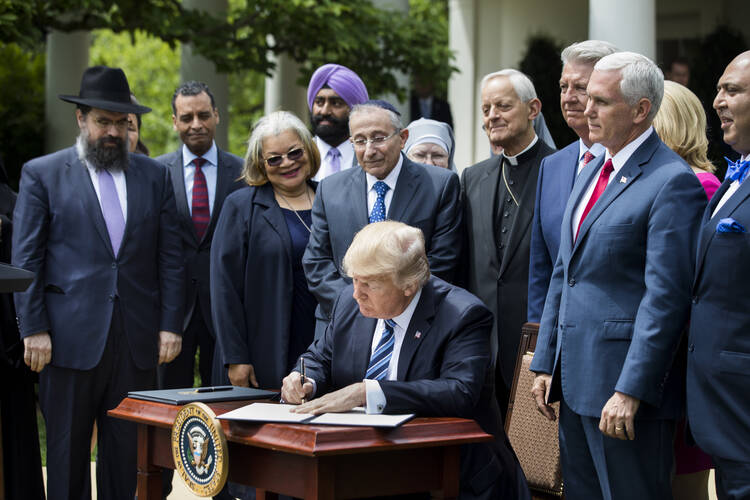WASHINGTON (CNS) -- The Trump administration on Oct. 6 issued interim rules expanding the exemption to the contraceptive mandate for religious employers, such as the Little Sisters of the Poor, who object on moral grounds to covering contraceptive and abortion-inducing drugs and devices in their employee health insurance.
The contraceptive mandate was put in place by the Department of Health and Human Services under the Affordable Care Act.
While providing an exemption for religious employers, the new rules maintain the existing federal contraceptive mandate for most employers.
President Donald Trump had pledged to lift the mandate burden placed on religious employers during a White House signing ceremony on May 4 for an executive order promoting free speech and religious liberty, but Catholic leaders and the heads of a number of Catholic entities had criticized the administration for a lack of action on that pledge in the months that followed.
Catholic leaders and the heads of a number of Catholic entities had criticized the administration for a lack of action on that pledge in the months that followed.
From the outset, churches were exempt from the mandate, but not religious employers. The Obama administration had put in place a religious accommodation for nonprofit religious entities such as church-run colleges and social service agencies morally opposed to contraceptive coverage that required them to file a form or notify HHS that they will not provide it. Many Catholic employers still objected to having to fill out the form.
The HHS mandate has undergone numerous legal challenges from religious organizations, including the Little Sisters of the Poor and Priests for Life.
A combined lawsuit, Zubik v. Burwell, made its way to the U.S. Supreme Court, where the justices in May 2016 unanimously returned the case to the lower courts with instructions to determine if contraceptive insurance coverage could be obtained by employees through their insurance companies without directly involving religious employers who object to paying for such coverage.
“We are optimistic that this news will prove to be a step toward victory for the fundamental freedoms of many Americans.”
Senior Health and Human Services officials who spoke to reporters on Oct. 5 on the HHS rule on the condition of anonymity said that the exemption to the contraceptive mandate would apply to all the groups that had sued against it. Groups suing the mandate all the way to the Supreme Court include the Little Sisters of the Poor, the Archdiocese of Washington, the Diocese of Pittsburgh, Eternal Word Television Network and some Catholic and other Christian universities.
In reaction immediately after the 150-page interim ruling was issued, religious groups that had opposed the mandate were pleased with the administration's action.
Michael Warsaw, EWTN chairman and CEO president, said the television network's legal team would be "carefully considering the exemptions announced today and the impact this may have on our legal challenge to the mandate, but we are optimistic that this news will prove to be a step toward victory for the fundamental freedoms of many Americans."
Mark Rienzi, senior counsel at the Becket Fund, told reporters in a telephone news conference an hour after the rule was released that it is a "common sense and balanced rule and a great step forward for religious liberty."
He said the rule "carves out a narrow exemption" and keeps the contraceptive mandate in place for those without moral or religious objections to it.
He noted that it does not provide immediate relief for those groups who had challenged it, such as the Little Sisters of the Poor, which Becket represents. They will "still need relief in courts," he said, but was confident now that it would happen.
"We've traveled a long way," he added, of the multiple challenges to the contraceptive mandate in recent years, which he described as an "unnecessary culture war fight."











It was:
"We are required by law to offer you the choice, your choice and your conscience."
It is:
"Because of our religious beliefs you have no choice here, even if you need it for medical reasons other than contraception. You can find work elsewhere."
With malice towards none and charity for all. - A. Lincoln